How to Merge Customers in Shopify: A Step-by-Step Guide
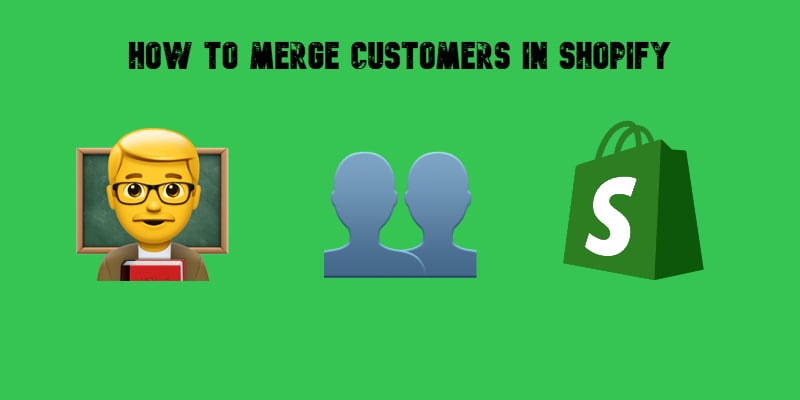
Duplicate customer profiles can clutter your Shopify admin, making order tracking and customer management less efficient. However, learning how to merge customers in Shopify can help reduce unnecessary chores by consolidating order history, streamlining communication, and improving customer insights — while your records stay accurate.
While Shopify allows store owners to merge customer profiles, there are specific conditions and limitations to keep in mind. The process can be done either from an individual customer profile or directly from the Customers page. Despite the selected method, you should always consider the restrictions — like active orders — that may prevent merging.
In this guide, we’ll walk you through how to merge Shopify customers using both methods, explain what happens to customer data, and outline situations where merging isn’t possible. Whether cleaning up duplicates or managing customer records more efficiently, this step-by-step guide will help you navigate the process.

Table of contents
What Happens When You Merge Customers in Shopify?
When you merge customers in Shopify, duplicate profiles are consolidated into a single record, preserving order history and essential customer details. This process helps store owners maintain cleaner databases, prevent duplicate communications, and improve analytics accuracy.
What Data is Transferred?
Merging customer profiles ensures that key data is retained, including:
- Order history — all past purchases from both profiles are combined.
- Saved addresses — shipping and billing addresses are merged.
- Tags and notes — any existing notes and tags are transferred.
What Data is Not Merged?
However, some customer-specific details are not transferred:
- Payment methods — saved cards and other payment details remain separate.
- Passwords — Shopify does not merge customer logins, so accounts with different credentials remain distinct.
- Loyalty points & third-party app data — external integrations may not sync properly.
Is Merging Customers in Shopify Reversible?
No — merging customers in Shopify is permanent. Once profiles are combined, there is no way to undo the merge. Store owners should carefully review customer data before confirming any changes.
Understanding how merging affects customer records is crucial for maintaining accurate data. In the next sections, we’ll cover how to merge customers in Shopify using both the Customers page and individual profiles, along with cases where merging isn’t possible.
How to Merge Customers in Shopify: Customer Profile Workflow
Follow this step-by-step guide to merge customers in Shopify from a customer profile page:
- Access the Customer Profile. From your Shopify admin, navigate to Customers. Locate and select the customer profile you want to keep as the primary record.
- Initiate the Merge. Click More actions, then select Merge customer from the dropdown menu.
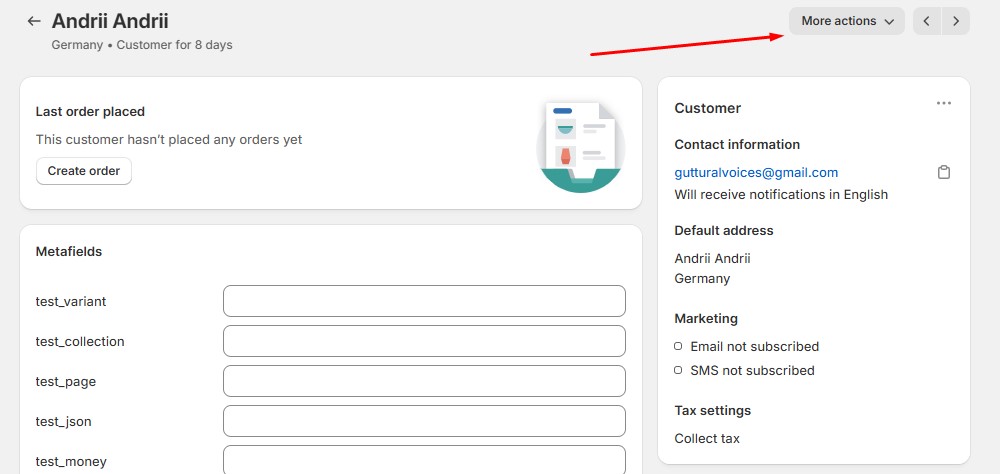
- Find the Duplicate Customer Profile. In the Find a customer to merge with section, search for the duplicate profile using one of the following details:
- First name
- Last name
- Email address
- Phone number
- Credit card number (if available)
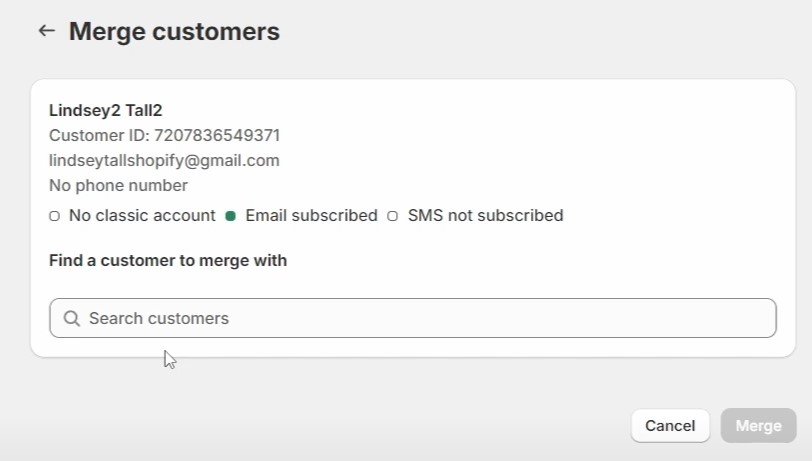
- Select and Review the Merge Details. Choose the appropriate customer profile from the search results. In the Merged customer section, review which data will be combined and which details will not be retained. If necessary, click Change contact information to update customer details before proceeding.
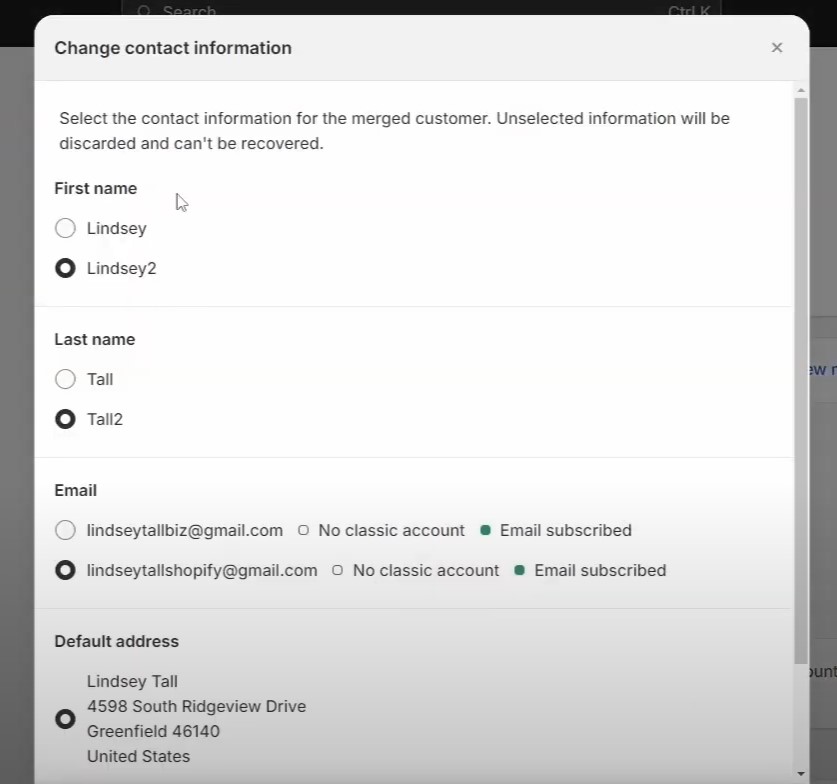
- Finalize the Merge. Click View merge details to verify the information. Once reviewed, click Merge, then confirm the action.
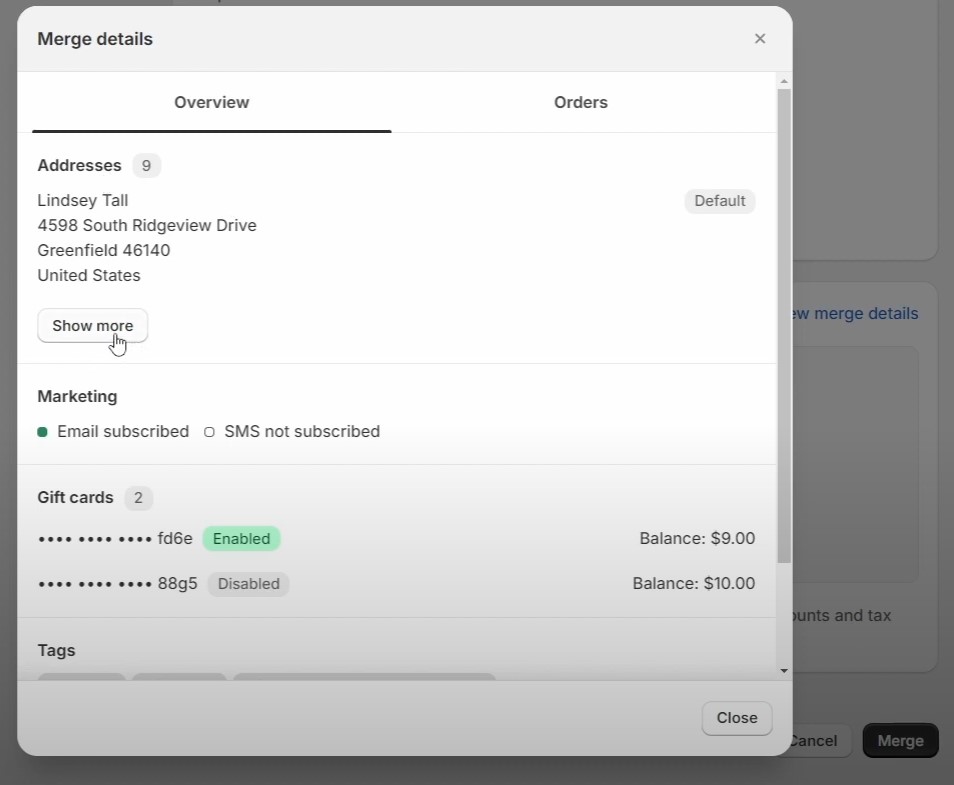
- Merging Additional Profiles (If Needed). If the customer has more than two duplicate profiles, repeat this process for each additional record.
By following these steps, you can merge customers in Shopify efficiently, ensuring accurate customer records and a streamlined database. Next, we’ll explore how to merge customer profiles directly from the Customers page.
How to Merge Customers in Shopify: Customers Page Workflow
If you need to merge customers in Shopify without opening individual profiles, you can do so directly from the Customers page. This method is ideal for managing bulk duplicate records efficiently. Follow these steps:
- Select the Customers to Merge. From your Shopify admin, go to Customers. Select the two customer profiles you want to merge. If only one duplicate profile appears in the list, proceed to the next step to search for the other.
- Initiate the Merge. Click the … button next to Edit customers. Select Merge customers from the dropdown menu.

- Find the Duplicate Customer Profile (if merging from a single selection). If you selected only one profile, search for the duplicate using the parameters mentioned in the customer profile workflow. Choose the correct duplicate profile from the search results.
- Review and Adjust Customer Information. In the Merged customer section, review which details will be retained and which will be discarded. If needed, click Edit contact information to update details before merging.
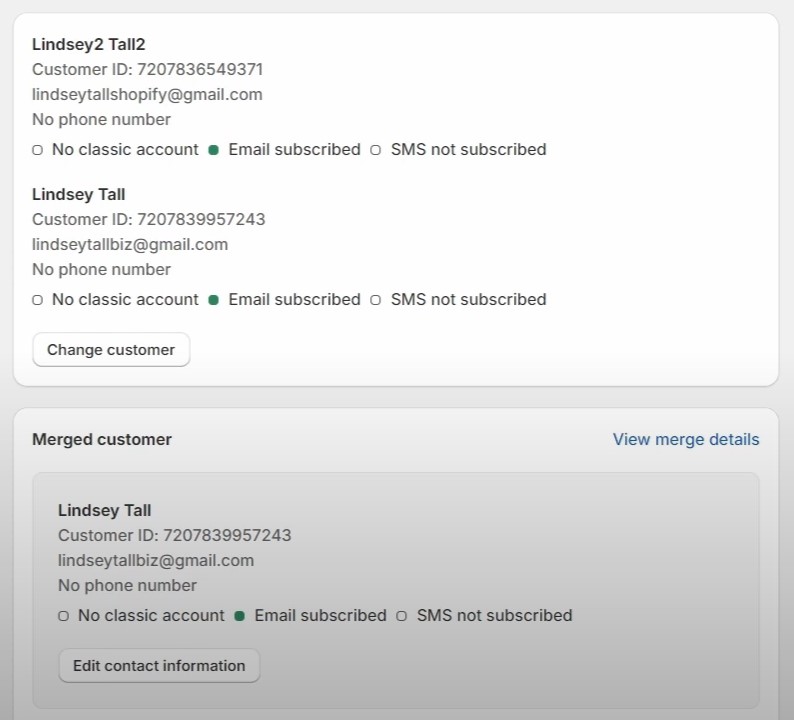
- Finalize the Merge. Click View merge details to verify the information. Once reviewed, click Merge, then confirm the action.

Watch this video for more details:
Now that you know how to merge customers in Shopify, let’s explore the limitations of Shopify’s merging feature and situations where merging isn’t possible.
When Merging Customers in Shopify is Not Possible
While Shopify allows customer profiles to be merged, certain conditions prevent merging. Understanding these limitations can help you avoid unexpected errors and ensure a smooth customer data management process.
The merge option is unavailable if either of the profiles falls into one of these categories:
- Subscription Contracts — If a profile has or ever had a subscription contract, it cannot be merged.
- B2B Customers — If a customer is linked to a company as a B2B buyer, or has past B2B orders tied to their profile, merging is restricted.
- Vaulted Credit Cards — If a customer has a saved payment method (vaulted credit card), their profile cannot be combined.
- Store Credit Accounts — Profiles with an active store credit balance cannot be merged.
- Multipass Login — If a customer uses Multipass login, merging is not allowed.
- Deleted or Redacted Profiles — If either profile has been deleted, redacted, or is currently undergoing a data redaction request, merging is impossible.
- Ongoing Customer Data Requests — If a customer profile merge or another customer data request is in progress, you must wait until it’s completed before attempting to merge.
These restrictions ensure data integrity and compliance with Shopify’s customer management system. Before merging, verify that none of these conditions apply to avoid unnecessary complications.
Character and Tag Limits
Also, pay attention to these limits:
- Customer notes must not exceed 5,000 characters (including spaces) after merging. If the combined notes surpass this limit, merging is blocked.
- Customer tags are capped at 250 tags in total. If merging two profiles results in exceeding this number, the process won’t proceed.
Marketing Preferences
And don’t forget that:
- If one profile is subscribed to email or SMS marketing, but the other is not, the merged customer profile will remain subscribed.
- Customers are not notified when their profiles are merged.
Best Practices for Merging Customers in Shopify
Merging customer profiles can help streamline your Shopify database, but doing it without preparation can lead to data loss or inconsistencies. To ensure a smooth process, follow these best practices before merging customers in Shopify.
1. Verify Order History Before Merging
Before merging duplicate customer profiles, check their order history. If each profile has significant purchase records, ensure that the correct one is kept as the primary profile. Once merged, all order details will be consolidated, but selecting the right profile ensures that loyalty tracking, returns, and future orders remain accurate.
2. Ensure Correct Customer Data is Retained
Customer profiles may contain different email addresses, phone numbers, or billing details. Before merging, review and update contact information to make sure you’re keeping the most accurate and up-to-date details. Shopify allows you to edit customer information before finalizing the merge, so take advantage of this step to avoid losing critical data.
3. Always Keep a Backup Before Merging
Since merging customers in Shopify is irreversible, it’s crucial to export customer data before making changes. Regular backups help prevent accidental data loss and give you a point of reference if something goes wrong.
To automate customer data backups, use the . This tool allows you to:
✅ Export customer data automatically to Google Sheets or other formats.
✅ Edit customer details in bulk, ensuring correct data before merging.
✅ Sync customer profiles seamlessly between Shopify and CRMs.
By leveraging an automated solution, you can prevent data loss, make bulk edits before merging, and maintain a well-organized customer database.
Conclusion
Managing duplicate customer profiles is essential for maintaining accurate records, improving customer interactions, and ensuring better analytics in Shopify. By learning how to merge customers in Shopify, store owners can consolidate purchase history, eliminate redundant data, and streamline customer management.
Before merging, always review order history, verify contact details, and create a backup to prevent data loss. Since the merge process is irreversible, double-checking customer information ensures that the most accurate data is retained.
For an extra layer of security, consider using the Import & Export Tool to automate customer data exports, sync profiles with CRMs, and make bulk edits before merging. This way, you can maintain a clean and well-structured customer database without unnecessary risks.
By following these best practices, you can merge customer profiles in Shopify efficiently and confidently, keeping your store’s customer data organized and up to date.
FAQ
Why should I merge duplicate customer profiles in Shopify?
Merging duplicate customers helps keep your Shopify database organized, ensuring accurate order history, better customer insights, and streamlined communication. It prevents confusion and duplicate marketing efforts.
How do I find duplicate customer profiles in Shopify?
You can find duplicates by searching for similar names, emails, phone numbers, or order histories under the Customers section in your Shopify admin. Shopify may also suggest potential duplicates when you initiate the merge process.
Can I undo a customer merge in Shopify?
No, merging customers in Shopify is permanent and cannot be undone. Before merging, review the data carefully and export customer information as a backup.
What happens to order history when I merge customers in Shopify?
All past orders from both customer profiles are consolidated into the merged profile. This ensures that purchase history remains intact, avoiding discrepancies in reporting and customer tracking.
Will the customer be notified when I merge their profiles?
No, Shopify does not send any notifications to customers when their profiles are merged. The process is entirely internal and does not affect the customer’s experience.
Can I merge more than two customer profiles at once?
No, Shopify only allows merging two profiles at a time. If you have multiple duplicates, you need to repeat the merge process for each additional profile.
What happens to marketing preferences during a merge?
If one profile is subscribed to email or SMS marketing, but the other is not, the merged profile will retain the subscribed status. Make sure to verify customer preferences before merging.
Why can’t I merge certain customer profiles in Shopify?
Shopify restricts merging for profiles with:
– Subscription contracts (past or active)
– B2B customers linked to a company
– Vaulted credit cards
– Store credit accounts
– Multipass logins
– Deleted or redacted accounts
If a profile falls under these categories, merging is not possible.
Can I edit customer information before merging?
Yes, Shopify allows you to edit contact details, email, and address before merging. During the process, you can choose which information to keep in the final profile.
How can I back up customer data before merging?
To prevent data loss, use the Import & Export Tool to:
✅ Export customer data automatically to Google Sheets.
✅ Edit customer details in bulk before merging.
✅ Sync customer profiles between Shopify and CRMs for seamless integration.
This ensures that you always have a backup in case you need to reference past customer records.









